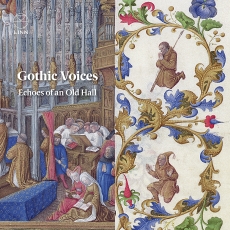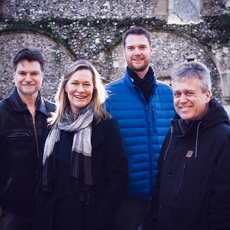Gothic Voices - Echoes of an Old Hall - American Record Guide
The Old Hall Manuscript is the most important source for English sacred music of the late 14th and early 15th Centuries. Its music stands at the transition between medieval and Renaissance style and compositional techniques, and it marks a time when English composers exerted more influence over their continental counterparts than at any other period in music history. The original layer of the collection was compiled between 1415 and 1421. Additional pieces were added in the early 1420s. In his notes to this recording, Julian Podger, one of the singers in Gothic Voices, distinguishes two principal styles of composition in the manuscript. The first is English Discant: a nearly block chordal idiom with the plainsong cantus firmus in the middle voice and the outer voices moving mainly in what we would call triadic harmony in first inversion. The predominance of the imperfect consonances of the third and sixth came to be known as the "Contenance Angloise", and this harmonic flavor can also be heard in the other style of writing, the freer chanson style with emphasis on the top voice or voices, often moving in an intricate contrapuntal web. The first half of the present program has the title "Contenance Angloise". It has subgroups of pieces involving motets and plainsong with a concluding setting of a Mass Ordinary text: a Gloria by John Cooke (fl 1402- 1419), an anonymous Sanctus, an anonymous Agnus Dei, and a Gloria by Leonel Power (c 1375-1445). Polytextual and isorhythmic motets were not yet extinct, and this program includes perhaps the ultimate example of this genre: `Veni Sancte Spiritus' by John Dunstable (c 1390-1453). The second half of the program, "Reverberances", ventures beyond the Old Hall repertory to the work of younger contemporaries like Guillaume Dufay (c1397-1474) and Gilles Binchois (c1400-60) who were influenced by the English style. This part of the program includes some secular chansons as well as chant and motets. It concludes with a five-part Gloria by Jehan Pycard (fl 1390-1400). The music in this part of the program tends towards what we would think of more characteristic Renaissance part writing, but it retains a medieval flavor in its modal grammar and cadences. The ensemble Gothic Voices was founded in 1980 by Christopher Page. Over the years they have released more than 25 recordings of medieval music. One of their most effective was "A Feather on the Breath of God" containing works by Hildegard of Bingen. A few years ago I had good things to say about their album "Mary Star of the Sea" (Linn 541; J/F 2017, p 219). Their goal is to "bring medieval music into the mainstream", but I observed at the time that their outstanding virtuosity and scholarly integrity guarantee that this is not a cheap popularizing of early music, but a communication of the vitality that is inherent in the medieval repertory. That ideal is certainly evident the present recording with highly engaging performances of music seldom heard in public. We are treated to amazingly clean tone with astoundingly precise ensemble and a nearly miraculous blending of solo voices. The tone is straight but never severe. They are beautifully recorded with a feeling of intimacy but never uncomfortably close.

